Mini pigs have grown in popularity and are often advertised as easy-to-care-for house pets. The reality is that caring for a pet pig comes with many challenges, and some so-called mini pigs may only stay mini for a short time! Consider these important points before adopting a mini pig.
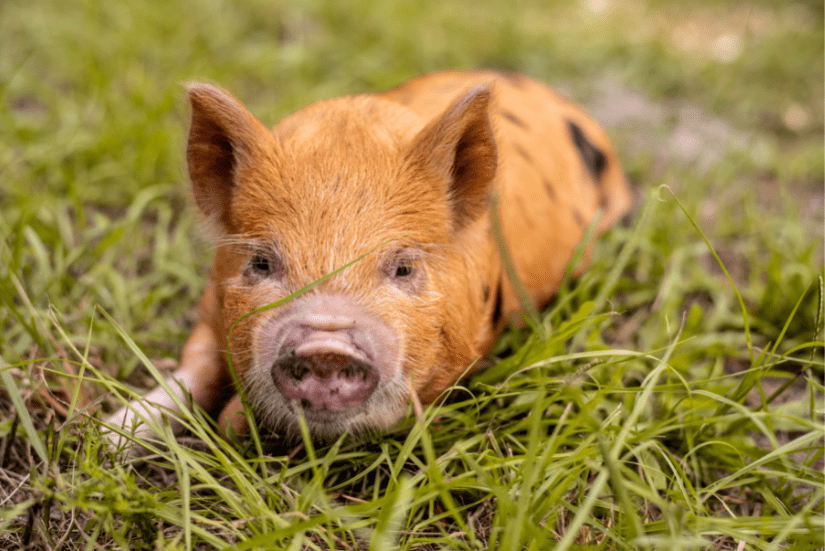
What is a mini pig?
A mini pig is not a specific breed of pig – it refers to any pig that has been selectively bred to be smaller in size. They are kept as pets and differ from the pigs on most farms. Many small breeds of pigs, such as the Vietnamese pot-bellied, the Kune Kune, and the Juliana (among others), have been cross-bred and selected for small size over many generations to produce the smaller pigs we see today.
How big are mini pigs?
Even the smallest breeds of pigs will not remain very small. Mini pigs typically weigh between 75 and 150 pounds, but can be as heavy as 200 pounds with a height of 14 to 20 inches at the shoulders.
Pigs are commonly surrendered because they grew larger than expected. Unfortunately, some mini pig breeders use tactics that mislead people into believing that mini pigs will remain small. Terms such as ‘micro’ and ‘teacup’ may be used to advertise their small size, but these terms have no official definition. Typically, the size of a mini pig can be estimated from the size of their parents. But it’s important to know that mini pigs will continue growing until four to five years of age, so the parents may not yet be fully grown.
Expect your mini pigs to grow larger than expected, as mini pigs vary in size depending on their breeds.
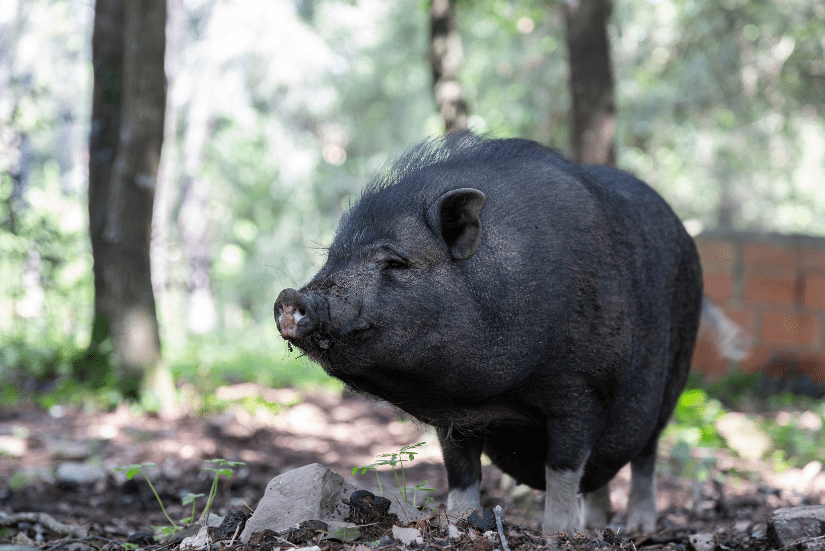
Are mini pigs legal?
Many people get a mini pig only to later realize they are not allowed in their municipality. Zoning restrictions are another reason why pet pigs end up in need of a new home. It is essential to check with your local government bylaws before bringing a mini pig home. Learn more about model municipal bylaws for farm animals.
What veterinary care do mini pigs require?
Pigs may live for up to 15 years. Providing veterinary care to your mini pig is an essential part of being a responsible pet guardian. Establishing a relationship with a veterinarian that treats pigs before adopting is important. Spaying/neutering, vaccinations, parasite control, dental care, hoof care, and grooming are all essential to keeping mini pigs healthy.
Because they are prey animals, sometimes pigs try to hide the fact that they are sick or injured. Do you have the knowledge or skills necessary to recognize common symptoms of disease, injury or infection in your pet pig?
What type of environment and housing is best for mini pigs?
People often expect caring for a pet pig to be similar to caring for a dog, but pigs have specific needs that are difficult to meet in a house. Mini pigs are best suited to an outdoor environment that provides them lots of space and opportunities to carry out their natural behaviours.
Pigs are curious animals and enjoy an environment where they can explore their surroundings. Pigs have a strong desire to root (“digging” with their nose), and they can become destructive if they do not have continual access to a suitable area to do this. Toys and enrichment are essential to keep mini pigs happy.
Pigs have difficulty keeping cool in summer and warm in winter. It is important to ensure that in warm weather, pigs are provided with a wallow (muddy area) and shelter from the sun – pigs can get sunburns! Pigs must always have access to warm, dry, draft-free, straw-bedded housing in cooler weather and at night.
Appropriate fencing must be used to enclose their outdoor area, as pigs are very strong and can uproot it, push it over and even dig underneath it if not properly secured. You will also need to consider protecting your pig from predators like coyotes, wolves, big cats, bears, or even loose dogs.
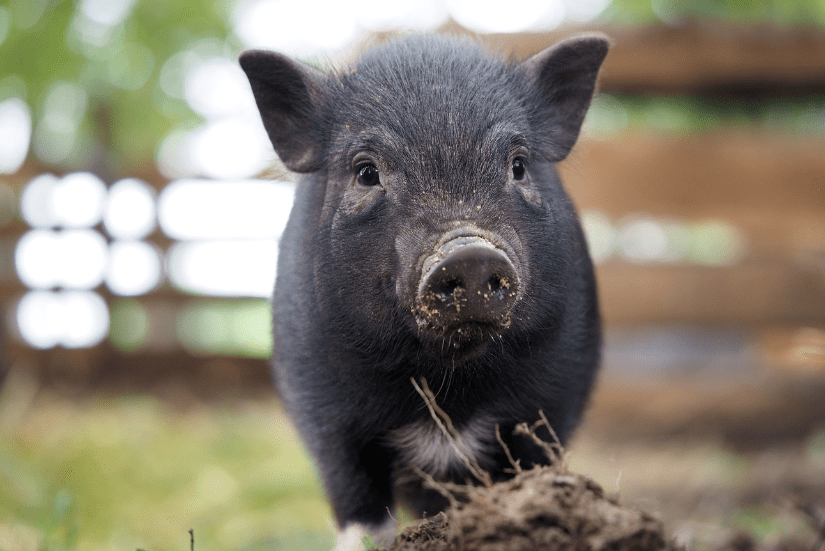
What do mini pigs eat?
Pigs are omnivores, meaning they eat both plant and animal protein. A mini pig’s diet should consist of a nutritionally-balanced feed specific for pigs. These feeds can be purchased at pet food or agricultural feed stores but are not always easy to find. In addition to their feed, pigs also enjoy a variety of fruits and vegetables. Pigs should also be offered fresh hay to increase their dietary fiber content. Pigs naturally forage for food, so providing foraging toys or areas is recommended.
Are mini pigs compatible with other pets?
As with any pet, pigs may or may not get along with other animals in the household. Dogs and pigs are an unpredictable combination, mainly because dogs are a predator species and pigs are a prey species. This may lead to unwanted bullying of your pet pig. Dogs have been known to attack pigs – even ones they have lived with for a while. Pigs can also behave aggressively towards dogs, especially when food is involved. Interactions between the two should always be supervised.
Though pigs may not get along with other types of pets, they are very social animals and should be housed with other pigs.
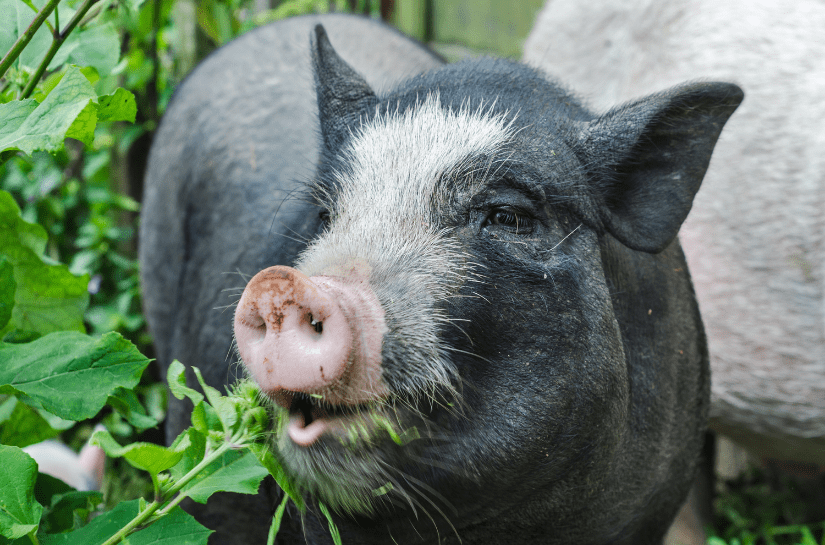
Can mini pigs be trained?
Pigs can be taught like any other animal using positive reinforcement. Food rewards go a long way with pigs! However, unlike puppy classes for dogs, there are not a lot of options for pig training classes. This means you must be comfortable training your pig on your own. Pigs are very intelligent animals, and guardians must have experience with pigs and a good understanding of pig behaviour, learning theory, and humane training methods in order to train them successfully.
Will mini pigs cause a nuisance for neighbours?
While pigs typically do not have a body odour, pig manure is very smelly. Most people say it smells worse than horse or cow manure. Pigs can also be very vocal – another thing that won’t make you very popular if you live close to your neighbours.
What happens to unwanted mini pigs?
In the end, like so many fad pets before them, the pigs pay the price for their popularity. Well-intentioned but poorly-informed caregivers become overwhelmed and, as a result, many pet pigs are relinquished to shelters, rescues and hobby farms. However, pet pigs can be tough to re-home, as these groups often have little or no capacity to take in unwanted pigs. You may be left facing euthanasia by a vet.
Releasing pigs into the wild is illegal and inhumane, as pigs used to living as a pet have no experience in the wild. If the pig does manage to survive and reproduce, the surrounding environment could be negatively impacted.
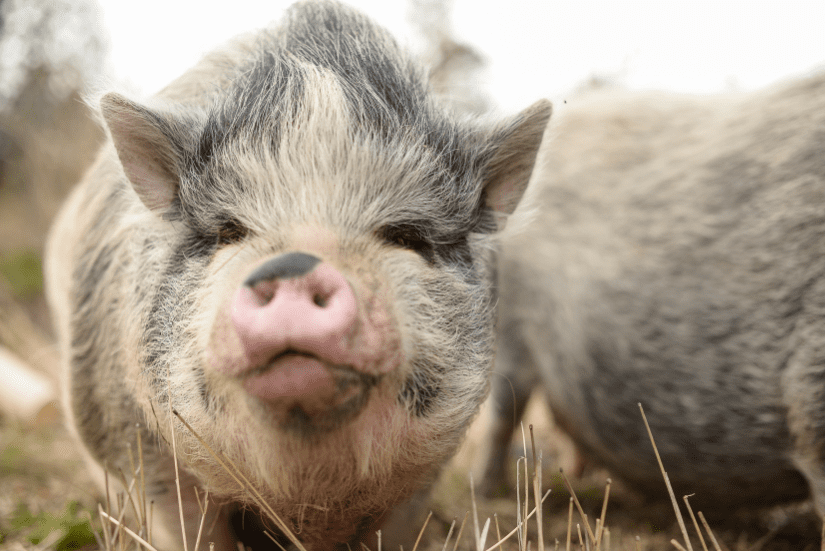
Mini pigs have very specific needs to keep them happy and healthy. Caring for a pig requires a great deal of commitment, time, money, resources, access to a pig vet, and compliance with local bylaws. For more information on this issue, feel free to email us.
Are you able to provide for a pig’s unique needs? To adopt a pig from the BC SPCA and sign up for alerts to be notified when pigs come into our care, check out our farm animal adoption page for available farm animals.
Subscribe to FarmSense e-newsletter
Passionate about farm animal welfare? Stay up-to-date on all things farm related from news, research and ways you can help farm animals.
The BC SPCA uses your personal information to update you on our work for animals as well as for advertising and analytics purposes. More information on uses and how to opt-out can be found in our Privacy Policy.
